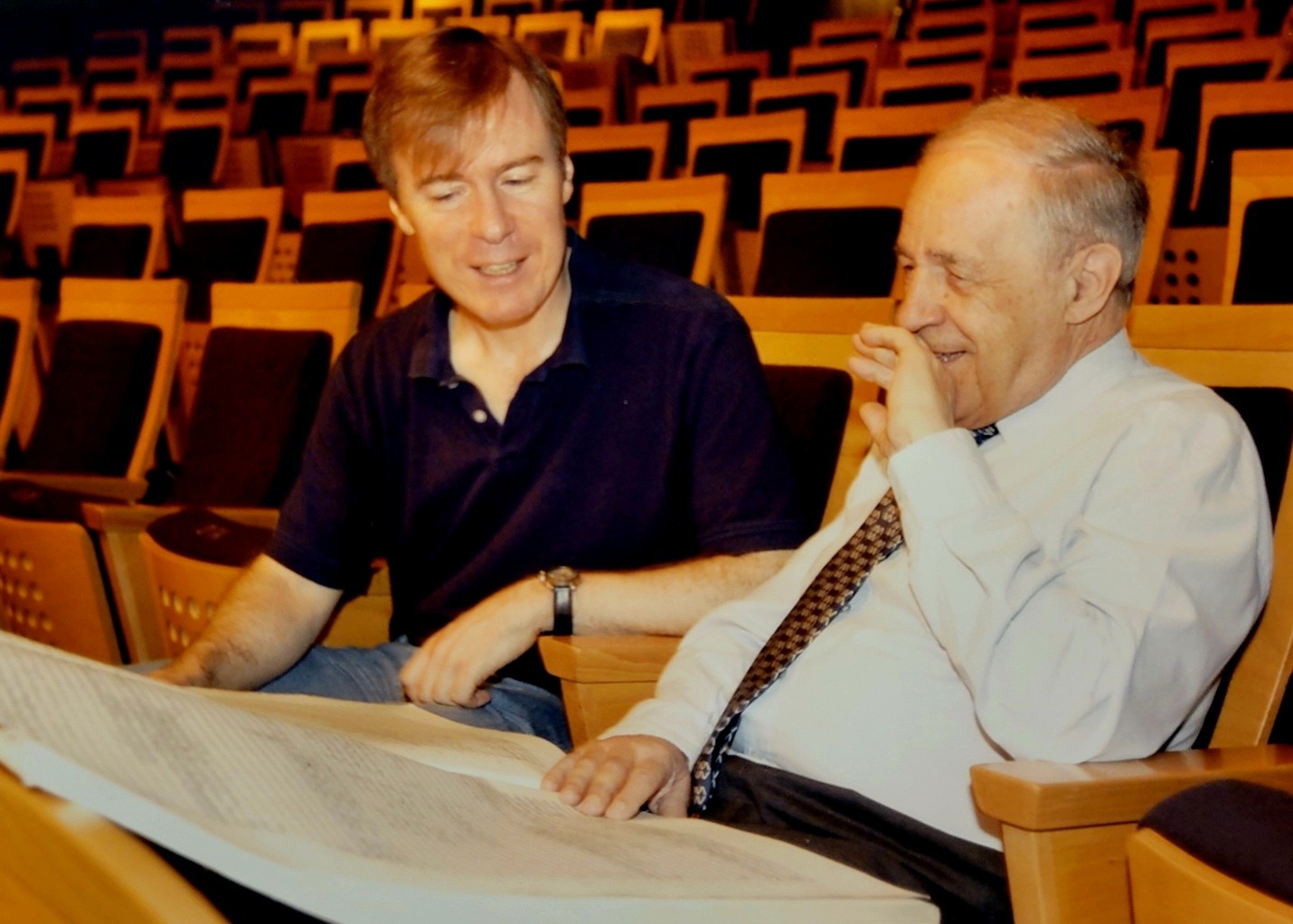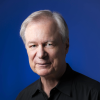-
03
-
03
-
03
-
03
-
03
-
03
-
03
-
03
-
03
-
03
-
03
-
03
-
03
-
03
-
03
-
03
-
03
-
-
-
03
-
03
-
03
-
03
-
03
-
03
-
03
-
03
-
-
03
-
03
-
03
-
03
-
03
-
-
03
-
03
-
03
-
03
-
-
03
Coming Into Being
Thursday, July 3, 2025
Posted By:David Robertson
—

David Robertson with Pierre Boulez as they prepare for a performance with the Orchestre National de Lyon in June 2002. Photo courtesy of David Robertson.
As Music Director of the Ensemble Intercontemporain (EIC) in Paris from 1991 until 2000 I often had the rare privilege to sit next to Pierre Boulez, the founder and President of the group, on the airplane when the EIC was on tour. I’ve always admired how Boulez maintained such varied occupations, juggling simultaneously the roles of composer, conductor, educator, writer, and administrator. One time I gave into curiosity and asked how he defined himself with all these different activities. “Pierre, what do you put down on the arrival card under Profession?” He replied quite simply: “I just put down Musician.”
The two pieces we are performing at the Aspen Music Festival, ...explosante-fixe... and sur Incises, are works whose premieres I was involved with, and thus I was able to observe their coming into being.
…explosante-fixe… was initially conceived as a memorial for Igor Stravinsky to be published in 1971 in Tempo Magazine’s issue devoted to that composer’s memory. It consists of a single sheet of manuscript paper with a seven-pitch melodic cell (called Originel) acting as a kind of sun around which seven various musically developed satellites (Transitoires) orbit.
Several realizations of the score for various acoustic/electronic combinations were withdrawn by the composer, who was unsatisfied with the limitations of music technology in the 1970s, which he described as “an infinite collection of confusing wires, long and unstable—I cannot explain the frustration.” Following the successful completion of Repons (1985) and the further research done at IRCAM (Institut de Recherche et Coordination Acoustique/Musique) in the mid-1980s, Boulez worked on a new version of explosante for MIDI Flute, ensemble, and electronics.
As the newly minted director of the EIC I attended the presentation of Transitoire VII in 1992. There Boulez brilliantly illuminated his compositional process for both the instrumental and electroacoustic materials in the work before the performance. It was evident to all, however, that the wonderful hour-long introduction was for a work that at the time lasted barely five minutes. This new piece was slated for one of the two programs that the EIC was to take on tour several months later to Italy, Germany, Belgium, and France, and there was general concern that the duration of the work was rather slim, especially given the equipment required for the electronics.
After carving the time necessary to complete the work out of his conducting schedule, Pierre turned in a piece of virtuoso composition clocking in at around 20 minutes. As the tour drew closer, he unfortunately began to suffer from an affliction in his legs that made all the logistical aspects of an intense tour of concerts an impossibility. This left me in the rather ideal situation of being able to listen to the composer lead the first rehearsals before I took over the performances. Pierre gained the added benefit of having the chance to further refine the electronics from the computer console in real time while I was on the podium.
Just as we had finished rehearsing the day before we were due to depart, Pierre told me that he was going to add the piece Mémoriale to conclude the work. He had created an electroacoustic part for that piece, which was itself a realization of the seven-note material from the 1971 manuscript. Pierre had written the purely acoustic piece in 1985 as a memorial for Laurence Beauregard, who died tragically young after helping Pierre develop his approach to the MIDI flute. Having now reclaimed the title Originel, it closes the work in a double memorial for both Stravinsky and Beauregard.
This experience revealed to me how Boulez always had a clear vision and a rich repertoire of ideas for his compositions, but that the solitary work of notation—and in the case of electronic sounds, working out the realization with his technical partner, Andrew Gerzso—required the precious commodity of time. The proof of this came at the end of our two-week tour, when it turned out that by staying home, Boulez had been blessed with two free weeks to write what became the middle movement of explosante, Transitoire V, and to finalize the orchestration of Originel.
The origin of sur Incises, which like a number of his pieces is an elaboration of material that existed in a shorter work, is the virtuoso Incises for piano solo from 1994. Pierre graciously suggested that I give a performance of the new work at the Edinburgh Festival in August 1998. We were all expecting the premiere to take place at the ninetieth birthday celebration of Paul Sacher in Basel on April 27, but in an echo of the explosante experience, there was a beautiful presentation of the eight existing minutes of the piece, which combined for the three trios of pianos, harps, and percussion with passages from the earlier solo work. There were certainly doubters in the hall who wondered if the master had lost the ability to create works of substantial length.
Boulez cleared his calendar for May, and by the beginning of June I had received a copy of the manuscript of the nearly forty-minute work! One recalls Mozart’s phrase: “composed, but not yet written down...” © — David Robertson
You can hear David Robertson's recital with the Aspen Contemporary Ensemble, An Evening with Pierre Boulez, on July 9 at 7:30 pm in Harris Concert Hall.

David Robertson—conductor, artist, thinker, composer, American musical visionary—occupies the most prominent podiums in opera, orchestral, and new music. He is a champion of contemporary composers and an ingenious and adventurous programmer. He was a protégé of Pierre Boulez, and from 1992 to 2000 he led the Ensemble Intercontemporain, which Boulez had founded in 1976. He appears with the world’s great orchestras, including the New York Philharmonic, Berlin Philharmonic, and many major European, Asian, and North and South American ensembles and festivals. Robertson serves as Director of Conducting Studies, Distinguished Visiting Faculty, of The Juilliard School.
-
03
-
03
-
03
-
03
-
03
-
03
-
03
-
03
-
03
-
03
-
03
-
03
-
03
-
03
-
03
-
03
-
03
-
-
-
03
-
03
-
03
-
03
-
03
-
03
-
03
-
03
-
-
03
-
03
-
03
-
03
-
03
-
-
03
-
03
-
03
-
03
-
-
03